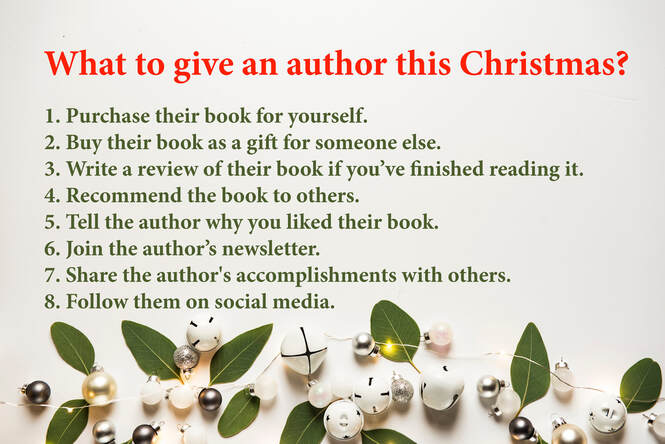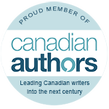|
As the holidays approach, I often get the question “What would you like for Christmas?
A few years ago I reached a stage in my life where I no longer knew what I wanted as a gift, or if I even wanted anything at all. I value the holidays as a time to unwind and catch up with family and friends. When the question of gifts comes up, I usually search my brain to come up with something that is not too expensive. I want to help the giver and save them the trouble of figuring it out on their own. As a new writer, I realized I might need something that I hadn’t thought of before, something that could help me become a better writer. I went to the internet for ideas. Here are some funny ones that I found:
We are all different, and some of the items found on general advice pages and forums on the internet might be exactly what some authors are looking for. I decided, however, to come up with my own list of what I think every author needs. Bonus: Some items are completely free.
I hope you enjoy the practical ideas I came up with so far. Holidays are a time for fun, and no matter how big or small the gift is, the author will appreciate it.
0 Comments
A sample household requires only one kettle. A prospective buyer will review the available options in a store and buy a model best suited to their needs. Once a kettle is selected, the rest of the available makes and models will probably be ignored for many years to come.
Furniture is similar. After some research and checking out a couch at a store to see if it’s comfy, a buyer will make a decision and then a purchase. Car shopping is the same; a buyer might have a favourite brand, but there is an expectation that such an expensive purchase will last for a long time. These types of purchases often have tight competition, because the manufacturers and producers need to convince the buyer to choose their product, and not a product made by someone else. An opportunity to try to convince the buyer might not come again for years. Books are more like fruit. A buyer may have certain favourites, but more often than not, they will still purchase other fruits regularly. A grocery store customer will look at the selection of fruits available and choose one that looks appealing. Price and freshness might be a factor in their decision; however, information about who grew it and where rarely make an impact. A buyer will also make fruit purchases often, in quantities higher than one, and will do so many times over the years from different suppliers. A reader may also have favourite books, genres and authors, but, an avid reader will look outside these boundaries and pick other books as well. Purchasing one book does not prevent the reader from purchasing another one by a different author or from borrowing more books from a local library. This means that there is no real competition between authors and they can, and should, work together on honing their writing skills and strive to bring quality work to their readers. I enlisted multiple beta readers for my manuscript in 2021, but this was the first time I had the chance to be a beta reader for someone else.
Jeff Farrell reached out to an online community I’m a part of asking for feedback from female beta readers. I jumped at the opportunity to gain some experience with beta reading and critique. It was exciting to read something that had never been published before. As I waited for the manuscript to be sent to me, anxiety kicked in. What if I didn’t like the book at all? What if I didn’t feel it was up to standard? What feedback would I offer? When I received a copy of Bad Blood, I opened it up at lunch and quickly became so immersed in the story that the thirty minutes flew by without me noticing. Why should writers do beta reading? As a writer, you have little opportunity to be part of the book development process outside of your own work. Your characters are great, you developed them well, the dialog is perfect — until a beta reader gives you feedback and shatters that view. When you read someone else’s work, there’s an emotional separation from the story. Suddenly you start thinking like a writer, and that’s when your editor's voice begins to chime in about the pacing, flow and plot. You are able to point out issues and offer suggestions, reinforcing what you know and learned during your own writing process. It makes you a better writer. Seeing other work in progress and in a different style than your own gives you an opportunity to reflect about your own style and voice. Reading and making notes refreshes the knowledge you have, thus imprinting it more strongly in your mind. I didn’t realize how much I’d learned during my publishing journey thus far, but being a beta reader helped me see how much knowledge I’d gained, and now I know that Book 2 of Sābanto will be of much better quality right from the start. It also helps others become better writers. There is power in experience. You are not the first person to write a book, nor will you be the last. Other authors have helped guide you, and now that you’re getting your first book out the door, the roles are reversed and you have an opportunity to help new authors who are still on their journeys. Helping others creates community and improves the quality of self-published books. Here is a brief review of the book: Alex, the main character and a narrator, feels like a failure. He’s lost his job as a journalist, and with nowhere to go, he’s remained in the place he knows best, Caracas, Venezuela. With his money running out, there is nothing else to do but to spend his time drinking at a rooftop bar called Mirador. He could go back home to Ireland, but some wounds should never be opened again. When he learns, however, that his brother has died in Caracas, he begins a quest to learn the truth about his death. From the very first lines of the book, the reader is hooked. You start reading and they start shooting. It leaves you hungry for more. Alex is navigating the corruption of the dictatorship-led country to gather information, but as a gringo (a white man), he is facing a wall of distrust and disinformation. He seeks help from a local, a reporter Gina, who senses there’s more to the story than simply a plastic surgery gone wrong. She takes a risk and jumps at the chance to fight the regime. Based on actual events and Jeff’s personal experiences during the time he spent in Venezuela as a journalist, the book provides detailed descriptions of Caracas and its people, transporting the reader there with ease. The author also very accurately describes the socio-political scene in a country that is deteriorating due to corruption, authoritarianism, crime and poverty. His clever use of Spanish words in the text is a constant reminder of where the book takes place and the surrounding atmosphere of this South American country. I’d recommend this book to anyone looking for a quick read with lots of action, and those for whom justice and social equality are worth fighting for. The book is currently on pre-order and is expected to be available in 2023. Website link: https://www.jefffarrellonline.com/ https://www.amazon.com/Bad-Blood-Alex-Regan-Thriller-ebook Photo by Yannick Pulver on Unsplash Why did you choose creative writing?
Writing is a great creative outlet for introverts and overthinkers. Those who know me well can attest that I have never been a quick thinker. My answers had to be carefully measured, which often made me the quiet one in the room. I’ve also always been better at expressing myself through writing, and it often takes me some time to craft a reply. Did you do a lot of writing when you were younger? I was a reader when I was young, but not a writer. I learned how to read when I was very young. There’s a story my mom told me, where I was just four years old and I was on a train trip with my parents, and fellow travelers were amazed that I was able to read a newspaper with understanding at such a young age. This ability meant I devoured books and became a knowledge sponge. Unfortunately, the strict school curriculum I was subjected to didn’t offer opportunities to be creative. Essay assignments were mostly about analyzing poems or books with a strict emphasis on history. That was when, feeling discouraged, I turned to the sciences. I concentrated on math, chemistry, and physics, as these provided me with clear structures that I could lean on. Writing essays became a mindless activity to just get by and get a good mark, not something that would further advance my understanding of creative writing. Did immigrating to Canada change your mind about creative writing? Not at all. I was eighteen when I immigrated to Canada. I entered Canadian high school with only a basic understanding of English. I remember sitting in the school hallway during my break period when one of the teachers came over to talk to me. I had no clue what they were saying, and only after a while did I realize that I had been asked to take my winter jacket off. When the teacher left I felt everyone's eyes on me, and that moment got imprinted in my memory. Being proficient in English felt like an unattainable goal. I buried any dreams to do any creative writing in favor of the scientific subjects that I knew well, and which would allow me to get into University and find a good job, where poor English skills and accents were not major obstacles to succeeding. I never abandoned books, though. I began to read more and more. First in Polish, but slowly I started to read in English as well. I always carried a book with me wherever I went, a habit that I keep to this day. My vocabulary continued to improve, but even though story ideas began to come to me, it was not enough to convince me that I could write. When did you gain the confidence to write? Writing and confidence don’t necessarily come together. I’ve heard many writers say this, and it’s true. When I sat down years later to write the first story, I still felt like I was kidding myself, because who wants to read a story written by some immigrant with broken English. I eventually put it on paper with the intention of one day lighting it on fire. I found the process of writing relaxing and enjoyable. My introvert self loves diving into the story and its characters, and exploring human emotions. Each evening I look forward to spending some time with the heroes and villains. I even enjoy editing, modifying and rewriting the manuscript. After six months of writing I became attached to the story and eventually gave it to my husband to read. What motivates you to keep pushing forward? Now that the publishing target date has been set for March 2022, I’m experiencing a lot of fear and uncertainty, but I wouldn't be here without the army of family and friends standing behind me giving me the courage to continue. To write. And to never let go of my dreams. |




 RSS Feed
RSS Feed



